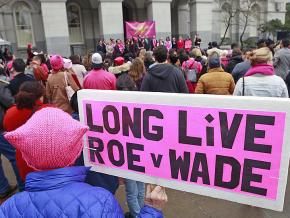Teaching Students for Life a lesson in Maine
Students for Life faced fierce opposition when they tried to spread their anti-abortion message in support of Brett Kavanaugh, report and .
REPRODUCTIVE RIGHTS activists turned out at the office of Sen. Susan Collins and Planned Parenthood in Portland, Maine, to speak out against demonstrations organized by the anti-choice group Students for Life on August 11.
The Portland rally by Students for Life, which claims to be an organization representing the “pro-life” generation and seeks to end abortion in the U.S., was one of many anti-choice rallies held over the weekend as part of a #Justice4Life bus tour to pressure key senators to support Brett Kavanaugh’s nomination for the Supreme Court.
Collins, who is a Republican, has said that she considers Roe v. Wade settled precedent and that she would not support a nominee to the Supreme Court who demonstrated “hostility to Roe.”
But in late June, a spokesperson from her office stated that Collins wouldn’t apply an “ideological litmus test” to Trump’s nominee, indicating that she will not press Kavanaugh on his stance toward Roe v. Wade.

The Portland branch of the International Socialist Organization (ISO) and the Southern Maine Democratic Socialists of America (DSA), along with individuals from a growing local coalition to oppose Kavanaugh’s nomination, kicked off the counterdemonstration with a speak-out to share their motivations and stories.
“I knew with my entire being. I only had one choice,” said one speaker. Speakers talked about the potential consequences of life without legal abortion: unsafe and deadly abortion procedures.
Speakers also expressed outrage and frustration with the weak protections that currently exist. Abortions are already challenging to obtain for workers and the poor, and disproportionately for people of color. The speakers underscored the need to prevent further restrictions on reproductive justice by fighting to improve the unjust conditions we already experience.
ONE IN four women in the U.S. have an abortion in their lifetime, and groups that oppose this form of health care and bodily autonomy are a minority in this country. This was apparent in the fact that our contingent outnumbered theirs from the start.
The anti-choice protest included older, church-based “pro-lifers” alongside younger student activists who claim their fight against reproductive rights is a fight to empower women.
One young anti-choicer proclaimed herself to be a pro-life feminist,” who, despite hoping for a world where maternal care, child care and health care are more available to empower women, spends her time organizing to limit health care options for women.
After the speak-out, pro-choice activists marched across the street and picketed the anti-choice rally. Our picket line encircled their small group in the courtyard facing Collins’ office downtown.
Chants of “Free abortion on demand,” “Our bodies, our choice” and “No to Kavanaugh” easily drowned out the Students for Life. For about an hour, our protest attracted the attention of tourist trolleys, two cops and many cameras.
Some of the anti-choice group had brought their children and tried to characterize our counterprotest as violent because we surrounded their event with a loud, confident pro-choice picket. But this is just the right’s cynical attempt to portray themselves as victims.
The fact is that reproductive health clinics, their workers and their patients are under violent siege — surrounded on the ground by anti-choice zealots who claim the space in front of clinic doors in order to harass and shame workers and patients, and from above through the war on women that has been waged by the right in legislatures and the courts.
Kavanaugh’s nomination to the Supreme Court is just the latest in a decades-long far-right string of attacks on pregnant people’s freedom and autonomy.
WITHIN AN hour, the anti-choice group had shrunk considerably while even more people had joined our circling picket line.
Later, on the Justice4Life Facebook event page, anti-choicers commented that they may take a break from participating in similar events because the counterprotests “outnumber us, are more coordinated than us” and “things seem to be elevating in regard to abortion and the Supreme Court nominee.”
Pro-choice demonstrators regrouped across the street to prepare for the second half of the Students for Life event, which was a walk up the hill to the Planned Parenthood to “bear witness.”
Pro-choice protesters blocked and slowed their passage, which dissuaded many of the bigoted group and forced them to leave. The remaining five “bore witness” to our passionate songs and chants and each passerby who shouted their support or stopped to join us in protecting the clinic.
This event was a reminder of the importance of ongoing organizing to defend reproductive rights, especially in the face of a Trump Supreme Court nomination. While Susan Collins avoids directly addressing the threat this poses to Roe v. Wade, we know what a Kavanaugh nomination and appointment will mean.
It will mean unsafe procedures, forcing people to carry pregnancies to term against their will, criminalization of pregnant people who seek out abortions and health care workers who provide reproductive care, and a rollback of socially progressive regulations such as anti-discrimination protections and further blows to labor rights.
We need to consistently present a strong opposition to Kavanaugh and what he stands for, in large numbers. The coalition formed in Portland to do this work is critically important, not just for this fight, but for future fights. Abortion rights will never be safe or protected unless we build a loud and visible movement to protect those rights.
All those in support of abortion rights should push for massive turnout to NARAL’s National Day of Action to protect Roe on August 26.
The extremist groups we face will likely never be swayed from their bigoted stance, but if we consistently oppose their activities, it will be clear that their views are unacceptable — and that we are many, and they are few.


